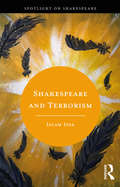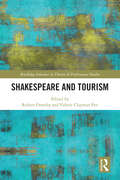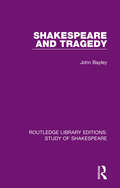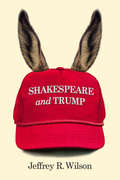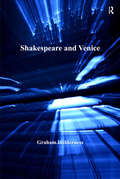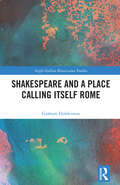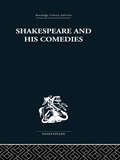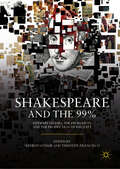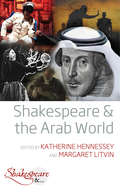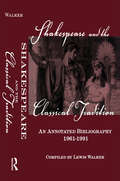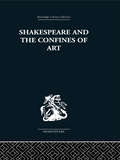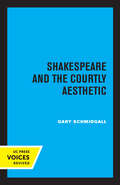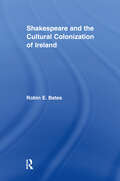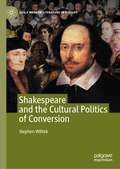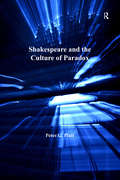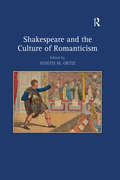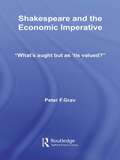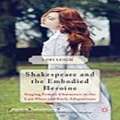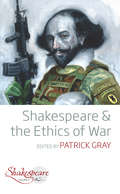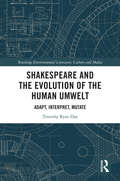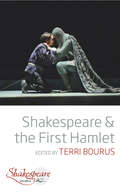- Table View
- List View
Shakespeare and Terrorism (Spotlight on Shakespeare)
by Islam IssaShakespeare and Terrorism delves into how extremists have responded to Shakespeare – whether they’ve attacked him or been inspired by him – and investigates what the playwright and his works can tell us about the nature, psychology, and consequences of terror. Literary critic and historian Islam Issa takes readers on a journey from Shakespeare’s Stratford-upon-Avon and London to a variety of locations: from Western Europe to the Balkans to the US, from North Africa to the Persian Gulf to Central Asia, and from the theatre to the digital world. Considering incidents from Shakespeare’s time through today, including the Gunpowder Plot and 9/ 11, as well as pivotal figures from Hamlet and Macbeth to Hitler and Bin Laden, this book brings to light new ideas about key characters, events, and themes both in Shakespeare’s plays and the world around them. A thrilling and accessible read, this ground-breaking book will enlighten and engage students, researchers, and general readers interested in Shakespeare, social sciences, history, and the complex relationships between life and art.
Shakespeare and Textual Studies
by Sonia Massai Kidnie Margaret JaneShakespeare and Textual Studies gathers contributions from the leading specialists in the fields of manuscript and textual studies, book history, editing, and digital humanities to provide a comprehensive reassessment of how manuscript, print and digital practices have shaped the body of works that we now call 'Shakespeare'. This cutting-edge collection identifies the legacies of previous theories and places special emphasis on the most recent developments in the editing of Shakespeare since the 'turn to materialism' in the late twentieth century. Providing a wide-ranging overview of current approaches and debates, the book explores Shakespeare's poems and plays in light of new evidence, engaging scholars, editors, and book historians in conversations about the recovery of early composition and publication, and the ongoing appropriation and transmission of Shakespeare's works through new technologies.
Shakespeare and Tourism (Routledge Advances in Theatre & Performance Studies)
by Valerie Clayman Pye Robert OrmsbyShakespeare and Tourism provides a dialogical mapping of Shakespeare studies and touristic theory through a collection of essays by scholars on a wide range of material. This volume examines how Shakespeare tourism has evolved since its inception, and how the phenomenon has been influenced and redefined by performance studies, the prevalence of the World Wide Web, developments in technology, and the globalization of Shakespearean performance. Current scholarship recognizes Shakespearean tourism as a thriving international industry, the result of centuries of efforts to attribute meanings associated with the playwright’s biography and literary prestige to sites for artistic pilgrimage and the consumption of cultural heritage. Through bringing Shakespeare and tourism studies into more explicit contact, this collection provides readers with a broad base for comparisons across time and location, and thereby encourages a thorough reconsideration of how we understand both fields.
Shakespeare and Tragedy (Routledge Library Editions: Study of Shakespeare)
by John BayleyEvery generation develops its own approach to tragedy, attitudes successively influenced by such classic works as A. C. Bradley’s Shakespearean Tragedy and the studies in interpretation by G. Wilson Knight. A comprehensive new book on the subject by an author of the same calibre was long overdue. In his book, originally published in 1981, John Bayley discusses the Roman plays, Troilus and Cressida and Timon of Athens as well as the four major tragedies. He shows how Shakespeare’s most successful tragic effects hinge on an opposition between the discourses of character and form, role and context. For example, in Lear the dramatis personae act in the dramatic world of tragedy which demands universality and high rhetoric of them. Yet they are human and have their being in the prosaic world of domesticity and plain speaking. The inevitable intrusion of the human world into the world of tragedy creates the play’s powerful off-key effects. Similarly, the existential crisis in Macbeth can be understood in terms of the tension between accomplished action and the free-ranging domain of consciousness. What is the relation between being and acting? How does an audience become intimate with a protagonist who is alienated from his own play? What did Shakespeare add to the form and traditions of tragedy? Do his masterpieces in the genre disturb and transform it in unexpected ways? These are the issues raised by this lucid and imaginative study. Professor Bayley’s highly original rethinking of the problems will be a challenge to the Shakespearean scholar as well as an illumination to the general reader.
Shakespeare and Trump
by Jeffrey R. WilsonShould we draw an analogy between Shakespeare’s tyrants—Richard III, Julius Caesar, Macbeth, and King Lear—and Donald Trump? In Shakespeare and Trump, Jeffrey Wilson applies literary criticism to real life, examining plot, character, villainy, soliloquy, tragedy, myth, and metaphor to identify the formal features of the Trump phenomenon, and its hidden causes, structure, and meanings. Wilsonapproaches his comparison prismatically. He first considers two high-concept (read: far-fetched) Shakespeare adaptations penned by Trump’s former chief political strategist Steve Bannon. He looks at University of Pennsylvania students protesting Trump by taking down a monument to Shakespeare. He reads Trump’s first 100 days in office against Netflix’s House of Cards. Wilson also addresses the summer 2017 Shakespeare in the Park production of Julius Caesar wherein an assassination of a Trump-ian leader caused corporations to withdraw sponsorship. These stories reveal a surprising—and bizarre—relationship between the provincial English playwright and the billionaire President of the United States, ostensibly a medieval king living in a modern world. The comparison reveals a politics that blends villainy and comedy en route to tragedy.
Shakespeare and Venice (Anglo-Italian Renaissance Studies)
by Graham HoldernessShakespeare and Venice is the first book length study to describe and chronicle the mythology of Venice that was formulated in the Middle Ages and has persisted in fiction and film to the present day. Graham Holderness focuses specifically on how that mythology was employed by Shakespeare to explore themes of conversion, change, and metamorphosis. Identifying and outlining the materials having to do with Venice which might have been available to Shakespeare, Holderness provides a full historical account of past and present Venetian myths and of the city's relationship with both Judaism and Islam. Holderness also provides detailed readings of both The Merchant of Venice and of Othello against these mythical and historical dimensions, and concludes with discussion of Venice's relevance to both the modern world and to the past.
Shakespeare and a Place Calling Itself Rome (Anglo-Italian Renaissance Studies)
by Graham HoldernessThis new examination of Shakespeare’s four Roman tragedies (Julius Caesar, Titus Andronicus, Coriolanus and Antony and Cleopatra) revisits Shakespeare’s dramatic recreations of ancient Rome in the light of considerations of place: the places from which Shakespeare initiated his imaginative reconstructions, where plays are written and performed the places he constructed within the plays, the places the plays imagine and recreate, together with the places from which he derived them the places within which we as readers and spectators experience those creations, where such plays are read, viewed and critically analysed. Alongside this analysis the book explores contemporary critical debates and the uses of place and space in selected modern adaptations – the Taviani brothers’ Italian film Caesar Must Die, Julie Taylor’s film Titus, John Osborne’s play A Place Calling Itself Rome and Ahmed Shawqi’s Arabic Death of Cleopatra.The book provides a descriptive, palimpsestic map of the places within which Shakespeare’s Roman plays operate, tracing the contours of Rome’s Republic and Empire, overlaid with the Europe of Shakespeare’s day, in which a Romanised London looked with fascination towards the East, towards Rome and Alexandria. Equipped with such a map we can attempt to do what Shakespeare did: to recreate ancient Rome in conjunction and rapprochement with its early modern and modern counterparts.
Shakespeare and his Comedies
by John Russell BrownFirst published in 1957. This edition reprints the second edition of 1962.The originality, vitality and variety of Shakespeare's comedies do not suggest a writer at ease with a formula which works to his own satisfaction and the pleasure of his audience; against first impressions they suggest an artist seeking to express an idea which is always eluding a completely developed presentation. The second edition of this book contains an extensive new chapter on Pericles, Cymbeline, The Winter's Tale and The Tempest.
Shakespeare and the 99%: Literary Studies, the Profession, and the Production of Inequity
by Sharon O'Dair Timothy FranciscoThrough the discursive political lenses of Occupy Wall Street and the 99%, this volume of essays examines the study of Shakespeare and of literature more generally in today’s climate of educational and professional uncertainty. Acknowledging the problematic relationship of higher education to the production of inequity and hierarchy in our society, essays in this book examine the profession, our pedagogy, and our scholarship in an effort to direct Shakespeare studies, literary studies, and higher education itself toward greater equity for students and professors. Covering a range of topics from diverse positions and perspectives, these essays confront and question foundational assumptions about higher education, and hence society, including intellectual merit and institutional status. These essays comprise a timely conversation critical for understanding our profession in “post-Occupy” America.
Shakespeare and the Arab World (Shakespeare & #3)
by Margaret Litvin Katherine HennesseyOffering a variety of perspectives on the history and role of Arab Shakespeare translation, production, adaptation and criticism, this volume explores both international and locally focused Arab/ic appropriations of Shakespeare’s plays and sonnets. In addition to Egyptian and Palestinian theatre, the contributors to this collection examine everything from an Omani performance in Qatar and an Upper Egyptian television series to the origin of the sonnets to an English-language novel about the Lebanese civil war. Addressing materials produced in several languages from literary Arabic (fuṣḥā) and Egyptian colloquial Arabic (‘ammiyya) to Swedish and French, these scholars and translators vary in discipline and origin, and together exhibit the diversity and vibrancy of this field.
Shakespeare and the Book Trade
by Lukas ErneShakespeare and the Book Trade follows on from Lukas Erne's groundbreaking Shakespeare as Literary Dramatist to examine the publication, constitution, dissemination and reception of Shakespeare's printed plays and poems in his own time and to argue that their popularity in the book trade has been greatly underestimated. Erne uses evidence from Shakespeare's publishers and the printed works to show that in the final years of the sixteenth century and the early part of the seventeenth century, 'Shakespeare' became a name from which money could be made, a book-trade commodity in which publishers had significant investments and an author who was bought, read, excerpted and collected on a surprising scale. Erne argues that Shakespeare, far from indifferent to his popularity in print, was an interested and complicit witness to his rise as a print-published author. Thanks to the book trade, Shakespeare's authorial ambition started to become bibliographic reality during his lifetime.
Shakespeare and the Classical Tradition: An Annotated Bibliography, 1961-1991 (Garland Reference Library Of The Humanities Ser.)
by Lewis WalkerThis bibliography will give comprehensive coverage to published commentary in English on Shakespeare and the Classical Tradition during the period from 1961-1985. Doctoral dissertations will also be included. Each entry will provide a clear and detailed summary of an item's contents. For pomes and plays based directly on classical sources like Antony and Cleopatra and The Rape of Lucrece, virtually all significant scholarly work during the period covered will be annotated. For other works such as Hamlet, any scholarship that deals with classical connotations will be annotated. Any other bibliographies used in the compiling of this volume will be described with emphasis on their value to a student of Shakespeare and the Classics.
Shakespeare and the Confines of Art
by Philip EdwardsFirst published in 1968. By selective study of certain of the comedies, tragedies and sonnets, Philip Edwards views Shakespeare's work as a whole and explains why his art developed as it did. The work which the author sees Shakespeare striving to create is the perfect fusion of comedy and tragedy and he suggests that we are watching the progress of a mind as acutely conscious as anyone today of the disorder and lack of meaning in the world. Nevertheless, it remains faithful to the possibility that within the imaginable forms of drama there exists that play which will satisfy the basic human need for reassurance, order and control.
Shakespeare and the Courtly Aesthetic
by Gary R. SchmidgallThis title is part of UC Press's Voices Revived program, which commemorates University of California Press’s mission to seek out and cultivate the brightest minds and give them voice, reach, and impact. Drawing on a backlist dating to 1893, Voices Revived makes high-quality, peer-reviewed scholarship accessible once again using print-on-demand technology. This title was originally published in 1981.
Shakespeare and the Cultural Colonization of Ireland (Literary Criticism and Cultural Theory)
by Robin BatesFocusing on plays (Richard II, Henry V, and Hamlet) which appear prominently in the writing of the Irish nationalist movement of the early twentieth century, this study explores how Irish writers such as Sean O’Casey, Samuel Beckett, W. B. Yeats, G. B. Shaw, James Joyce, and Seamus Heaney resisted English cultural colonization through a combination of reappropriation and critique of Shakespeare's work.
Shakespeare and the Cultural Politics of Conversion (Early Modern Literature in History)
by Stephen WittekThis book takes a close look at Shakespeare’s engagement with the flurry of controversy and activity surrounding the concept of conversion in post-Reformation England. For playhouse audiences during the period, conversional thought encompassed a markedly diverse, fluid amalgamation of ideas, practices, and arguments centered on the means by which an individual could move from one category of identity to another. In an analysis that includes chapter-length readings of The Taming of the Shrew, Henry IV Part I, The Merchant of Venice, Othello, and The Tempest, the book argues that Shakespearean drama made a unique and substantive intervention in public discourse surrounding conversion, and continues to speak meaningfully about conversional experience for audiences in the present age. It will be of particular benefit to students and scholars with an interest in theatrical history, performance theory, theology, cultural studies, race studies, and gender studies.
Shakespeare and the Culture of Paradox (Studies In Performance And Early Modern Drama Ser.)
by Peter G. PlattExploring Shakespeare's intellectual interest in placing both characters and audiences in a state of uncertainty, mystery, and doubt, this book interrogates the use of paradox in Shakespeare's plays and in performance. By adopting this discourse-one in which opposites can co-exist and perspectives can be altered, and one that asks accepted opinions, beliefs, and truths to be reconsidered-Shakespeare used paradox to question love, gender, knowledge, and truth from multiple perspectives. Committed to situating literature within the larger culture, Peter Platt begins by examining the Renaissance culture of paradox in both the classical and Christian traditions. He then looks at selected plays in terms of paradox, including the geographical site of Venice in Othello and The Merchant of Venice, and equity law in The Comedy of Errors, Merchant, and Measure for Measure. Platt also considers the paradoxes of theater and live performance that were central to Shakespearean drama, such as the duality of the player, the boy-actor and gender, and the play/audience relationship in the Henriad, Hamlet, As You Like It, Twelfth Night, Antony and Cleopatra, The Winter's Tale, and The Tempest. In showing that Shakespeare's plays create and are created by a culture of paradox, Platt offers an exciting and innovative investigation of Shakespeare's cognitive and affective power over his audience.
Shakespeare and the Culture of Romanticism
by Joseph M. OrtizThe idea of Shakespearean genius and sublimity is usually understood to be a product of the Romantic period, promulgated by poets such as Coleridge and Byron who promoted Shakespeare as the supreme example of literary genius and creative imagination. However, the picture looks very different when viewed from the perspective of the myriad theater directors, actors, poets, political philosophers, gallery owners, and other professionals in the nineteenth century who turned to Shakespeare to advance their own political, artistic, or commercial interests. Often, as in John Kemble’s staging of The Winter’s Tale at Drury Lane or John Boydell’s marketing of paintings in his Shakespeare Gallery, Shakespeare provided a literal platform on which both artists and entrepreneurs could strive to influence cultural tastes and points of view. At other times, Romantic writers found in Shakespeare’s works a set of rhetorical and theatrical tools through which to form their own public personae, both poetic and political. Women writers in particular often adapted Shakespeare to express their own political and social concerns. Taken together, all of these critical and aesthetic responses attest to the remarkable malleability of the Shakespearean corpus in the Romantic period. As the contributors show, Romantic writers of all persuasions”Whig and Tory, male and female, intellectual and commercial”found in Shakespeare a powerful medium through which to claim authority for their particular interests.
Shakespeare and the Digital World
by Christie Carson Peter KirwanDue to the unique cultural capital of his works, Shakespeare has long been the test subject for new methods and digital advances in arts scholarship. Shakespeare sits at the forefront of the digital humanities – in archiving, teaching, performance and editing – impacting on scholars, theatres and professional organisations alike. The pace at which new technologies have developed is unprecedented (and the pressure to keep up is only growing). This book offers seventeen new essays that assess the opportunities and pitfalls presented by the twenty-first century for the ongoing exploration of Shakespeare. Through contributions from a broad range of scholars and practitioners, including case studies from those working in the field, the collection engages with the impact of the digital revolution on Shakespeare studies. By assessing and mediating this sometimes controversial digital technology, the book is relevant to those interested in the digital humanities as well as to Shakespeare scholars and enthusiasts.
Shakespeare and the Economic Imperative: “What’s aught but as ‘tis valued?” (Studies in Major Literary Authors)
by Peter F. GravDespite the volume of work Shakespeare produced, surprisingly few of his plays directly concern money and the economic mindset. Shakespeare and the Economic Imperative examines the five plays that do address monetary issues (The Comedy of Errors, The Merry Wives of Windsor, The Merchant of Venice, Measure for Measure and Timon of Athens), plays in which Shakespeare’s view of how economic determinants shape interpersonal relationships progressively darkens. In short, what thematically starts out in farce ends in nihilistic tragedy. Working within the critical stream of new economic criticism, this book uses formal analysis to interrogate how words are used — how words and metaphoric patterns from the quantifiable dealings of commerce transform into signifiers of qualitative values and how the endemic employment of discursive tropes based on mercantile principles debases human relationships. This examination is complemented by historical socio-economic contextualization, as it seems evident that the societies depicted in these plays reflect the changing world in which Shakespeare lived and wrote.
Shakespeare and the Eighteenth-Century Novel
by Kate RumboldThe eighteenth century has long been acknowledged as a pivotal period in Shakespeare's reception, transforming a playwright requiring 'improvement' into a national poet whose every word was sacred. Scholars have examined the contribution of performances, adaptations, criticism and editing to this process of transformation, but the crucial role of fiction remains overlooked. Shakespeare and the Eighteenth-Century Novel reveals for the first time the prevalence, and the importance, of fictional characters' direct quotations from Shakespeare. Quoting characters ascribe emotional and moral authority to Shakespeare, redeploy his theatricality, and mock banal uses of his words; by shaping in this way what is considered valuable about Shakespeare, the novel accrues new cultural authority of its own. Shakespeare underwrites, and is underwritten by, the eighteenth-century novel, and this book reveals the lasting implications for both of their reputations.
Shakespeare and the Embodied Heroine
by Lori LeighShakespeare and the Embodied Heroine is a dynamic cross-period investigation of Shakespeare's notable female characters from the late plays. Using the Restoration and eighteenth century adaptations of Shakespeare's plays, this book explores female characters from a theatrical point-of-view that includes a close-reading and imagining of the text with a 'directorial eye', performance history, and practical staging experiments. Leigh reveals evidence to question certain conventional interpretations of Shakespeare's heroines and also documents a paradoxical reduction of sexuality and independent agency for Shakespeare's female roles as they started to be played by actresses rather than boy players. Highlighting the manner in which Shakespeare's female characters have the power to question, subvert, and reposition gender boundaries, and illuminating the complexity and multiplicity of the ways the women in Shakespeare's plays express their agency and desire, this book provides fascinating new readings on the staging and reception of Shakespeare's heroines.
Shakespeare and the Ethics of War (Shakespeare & #5)
by Patrick GrayHow does Shakespeare represent war? This volume reviews scholarship to date on the question and introduces new perspectives, looking at contemporary conflict through the lens of the past. Through his haunting depiction of historical bloodshed, including the Trojan War, the fall of the Roman Republic, and the Wars of the Roses, Shakespeare illuminates more recent political violence, ranging from the British occupation of Ireland to the Spanish Civil War, the Balkans War, and the past several decades of U. S. military engagement in Iraq and Afghanistan. Can a war be just? What is the relation between the ruler and the ruled? What motivates ethnic violence? Shakespeare’s plays serve as the frame for careful explorations of perennial problems of human co-existence: the politics of honor, the ethics of diplomacy, the responsibility of non-combatants, and the tension between idealism and Realpolitik.
Shakespeare and the Evolution of the Human Umwelt: Adapt, Interpret, Mutate (Routledge Environmental Literature, Culture and Media)
by Timothy Ryan DayShakespeare and the Evolution of the Human Umwelt brings together research on Shakespeare, biosemiotics, ecocriticism, epigenetics and actor network theory as it explores the space between nature and narrative in an effort to understand how human bodies are stories told in the emergent language of evolution, and how those bodies became storytellers themselves. Chapters consider Shakespeare’s plays and contemporary works, such as those of Barbara Kingsolver and Margaret Atwood, or productions for which Shakespeare is a genetic forebear, as evolutionary artefacts which have helped to shape the human umwelt—the species-specific linguistic habitat that humans share in common. The work investigates the juncture where semisphere meets biosphere and illuminates the role that narrative plays in our construction of the world we occupy. The plays of Shakespeare, as works that have had unparalleled cultural diffusion, are uniquely situated to speak to the ways in which ideas and the texts they use as vehicles are always material, always environmental, and always alive. The book discusses Shakespeare’s works as vital nodes in our cultural, historical, moral and philosophical networks, but also as environmental actors in and of themselves. Plays are presented alternately as digitally encoded bits of culture awaiting their connection to an analog world, or as bacteria interacting with living organisms in both productive and destructive ways, altering their structure and creating new meaning through movement that is simultaneously biological and poetic. This book will be of great interest to students and scholars of ecocriticism looking to model ecocritical readings and bridge gaps between scientific, philosophical and literary thinking.
Shakespeare and the First Hamlet (Shakespeare & #9)
by Terri BourusThe first edition of Hamlet – often called ‘Q1’, shorthand for ‘first quarto’ – was published in 1603, in what we might regard as the early modern equivalent of a cheap paperback. Yet this early version of Shakespeare’s classic tragedy is becoming increasingly canonical, not because there is universal agreement about what it is or what it means, but because more and more Shakespearians agree that it is worth arguing about. The essays in this collected volume explore the ways in which we might approach Q1’s Hamlet, from performance to book history, from Shakespeare’s relationships with his contemporaries to the shape of his whole career.
